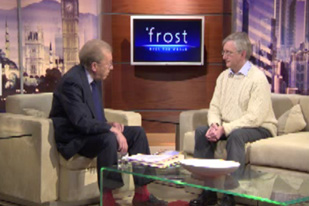
Craig Murray
The former UK ambassador to Uzbekistan talks about state repression and torture.
 |
| Craig Murray, the former UK ambassador to Uzbekistan, talks to Sir David Frost |
Sir David Frost: When Craig Murray arrived in Uzbekistan in 2002 he was a young ambassador with a sparkling career. It was in the build-up to the Iraq war and Uzbekistan was a key ally in the ‘war on terror’.
Just two years later Craig Murray had become a deep embarrassment to the British government after his outspoken remarks on human rights abuses and torture in the former Soviet state. In dispatch after dispatch he wrote of his concern about the Karimov regime and his fear that Britain was, albeit indirectly, obtaining intelligence through torture.
In 2004 Craig Murray was removed from his post and resigned from the foreign office. Now the Scottish diplomat has got the paper-back version of his book coming out about his extraordinary experiences, Murder in Samarkand.
How much murder was there in Samarkand? How many lives were lost to this regime?
Craig Murray: Well the biggest single loss of life would have been the Andijan massacre in 2005 in which about 750 demonstrators were shot dead and many more injured. But on a year by year basis several hundred people every year are disappeared, tortured, disappear into the death camps and aren’t seen again. This is a regime that rules by terror.
DF: And how did the foreign office respond the first time you made these revelations to them about what was going on out there? Initially were they horrified by what was going on or not?
CM: They didn’t seem to be too concerned by what was going on. The first response I got from the foreign office was a letter to say they were concerned that I was over-focused on human rights to the detriment of wider British interests. Their view was that Karimov was an ally in the ‘war on terror’, therefore what he did to his own population wasn’t really the ball I should be keeping my eye on.
DF: Well that is the odd thing, he was an ally in the ‘war on terror’ but he was running a terror state.
CM: That is true. Of course the ‘war on terror’ does not include state terror when it is used by the people who are most fond of that expression.
DF: Some of the things one reads about, for example the two people who were boiled.
CM: That was one of the earliest cases I dealt with where we had detailed photos of people who had been killed in one of the gulags. We were able to get a pathology report from the UK based on those photos, which said their finger nails had been pulled out, they had been beaten around the face and neck and literally boiled alive. And it was emersion in boiling liquid not splashing because there was a clear tide mark around the upper torso and 100 per cent scalding underneath.
DF: Is there any hope that Karimov will be overthrown? Maybe if more people in Uzbekistan read your book.
CM: I think getting my book into Uzbekistan would be a problem. I think the situation is not stable. One of the mistakes the West made is we were describing Karimov as a force for stability in the region whereas in fact what you have is this terrible pressure cooker where you have this terrific repression, increasing poverty, no outlet at all for dissent and it will end in violence eventually. I wouldn’t predict that to happen in the next 12 months or so but eventually it will come to it.
DF: Is it inevitable that decisions like this will always be made by governments or foreign offices? Is there always that pull between idealism on the one hand and we have got to keep quiet about this on the other?
CM: I would characterise it more as a failure to distinguish between short term interests and long term interests. Because it is almost never in the long term interests or useful to back a crazed dictator. A couple of years after I was removed from my post Karimov turned on the United States and kicked them out and turned back to Putin’s Russia instead. So all the support, the $500 million of aid a year the Americans were giving Karimov, the diplomatic protection we and the Americans gave him came to nothing. If you look back at the history of US sponsored villains if you like, and you can think of Noriega or bin Laden or Saddam Hussein, it always goes wrong in the end.
DF: So you predict that Karimov will be overthrown one day but his people may have to tolerate him for a while yet?
CM: To build up a head of steam for a successful revolution against a government that is prepared to use extreme repression. At Andijan we saw the start of the pro-democracy demonstrations that have characterised the colour revolutions in the former Soviet Union and the government just mowed them down. In those circumstances to be able to get a successful revolutionary movement going is extremely hard.
To contact us click on ‘Send your feedback’ at the top of the page